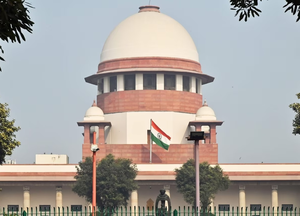SC seeks explanation from registry for accepting counter affidavit from non-party
New Delhi, Nov 17, 2024, IANS

New Delhi, Nov 17 (IANS) A 2-judge Bench of the Supreme Court has sought an explanation from the apex court registry as to how a counter affidavit from a non-party could be accepted. In its order, a bench headed by Justice Bela M. Trivedi noted that impleadment application of the proposed respondent-complainant was never allowed by the court but a counter affidavit filed on his behalf has been placed on record. “It appears that the application (IA No. 161791/2024) seeking impleadment of the said proposed respondent has not been allowed by the Court. Registry is directed to explain as to how, such counter affidavit from the proposed respondent-complainant, who is not a party, could be accepted,” said the Bench, also comprising Justice S.C. Sharma. Allowing time for the counsel appearing on behalf of the state of Punjab to get instructions on the latest status of the investigation, the apex court posted the matter for hearing after two weeks. Interim order to continue till the next date of hearing, it added. A vacation bench of the Supreme Court, in June this year, ordered that the petitioner will not be arrested in connection with FIR No. 07/2024 registered at P.S. Tarsikka, District Amritsar Rural, Punjab till the next date of hearing. Before this, the Punjab and Haryana High Court had rejected the anticipatory bail plea of the petitioner considering the nature and gravity of the offence. After perusing the record, it had said, “The present case was registered on the statement of the complainant with the allegation that the petitioner along with co-accused, while being armed with 'datar', had inflicted multiple injuries on the person of the complainant, out of which injury No.1 was found to be grievous in nature. Though the said injury was not on the vital part of the body, yet it is grievous in nature and recovery of weapon of offence is yet to be effected from the petitioner for which his custodial interrogation is required.”